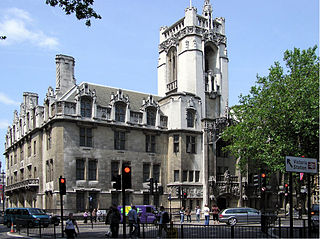Related Research Articles
A tort is a civil wrong, other than breach of contract, that causes a claimant to suffer loss or harm, resulting in legal liability for the person who commits the tortious act. Tort law can be contrasted with criminal law, which deals with criminal wrongs that are punishable by the state. While criminal law aims to punish individuals who commit crimes, tort law aims to compensate individuals who suffer harm as a result of the actions of others. Some wrongful acts, such as assault and battery, can result in both a civil lawsuit and a criminal prosecution in countries where the civil and criminal legal systems are separate. Tort law may also be contrasted with contract law, which provides civil remedies after breach of a duty that arises from a contract. Obligations in both tort and criminal law are more fundamental and are imposed regardless of whether the parties have a contract.
Delict is a term in civil and mixed law jurisdictions whose exact meaning varies from jurisdiction to jurisdiction but is always centered on the notion of wrongful conduct.
False imprisonment or unlawful imprisonment occurs when a person intentionally restricts another person's movement within any area without legal authority, justification, or the restrained person's permission. Actual physical restraint is not necessary for false imprisonment to occur. A false imprisonment claim may be made based upon private acts, or upon wrongful governmental detention. For detention by the police, proof of false imprisonment provides a basis to obtain a writ of habeas corpus.

English tort law concerns the compensation for harm to people's rights to health and safety, a clean environment, property, their economic interests, or their reputations. A "tort" is a wrong in civil law, rather than criminal law, that usually requires a payment of money to make up for damage that is caused. Alongside contracts and unjust enrichment, tort law is usually seen as forming one of the three main pillars of the law of obligations.
Economic torts, which are also called business torts, are torts that provide the common law rules on liability which arise out of business transactions such as interference with economic or business relationships and are likely to involve pure economic loss.
Ex turpi causa non oritur actio is a legal doctrine which states that a plaintiff will be unable to pursue legal relief and damages if it arises in connection with their own tortious act. The corresponding Ex turpe causa non oritur damnum, "From a dishonourable cause, no damage arises" is a similar construction. Particularly relevant in the law of contract, tort and trusts, ex turpi causa is also known as the illegality defence, since a defendant may plead that even though, for instance, he broke a contract, conducted himself negligently or broke an equitable duty, nevertheless a claimant by reason of his own illegality cannot sue. The UK Supreme Court provided a thorough reconsideration of the doctrine in 2016 in Patel v Mirza.
Harassment is a topic which, in the past few decades, has been taken increasingly seriously in the United Kingdom, and has been the subject of a number of pieces of legislation.
In the English law of negligence, the acts of the claimant may give the defendant a defence to liability, whether in whole or part, if those acts unreasonably add to the loss.
United Kingdom employment equality law is a body of law which legislates against prejudice-based actions in the workplace. As an integral part of UK labour law it is unlawful to discriminate against a person because they have one of the "protected characteristics", which are, age, disability, gender reassignment, marriage and civil partnership, race, religion or belief, sex, pregnancy and maternity, and sexual orientation. The primary legislation is the Equality Act 2010, which outlaws discrimination in access to education, public services, private goods and services, transport or premises in addition to employment. This follows three major European Union Directives, and is supplement by other Acts like the Protection from Harassment Act 1997. Furthermore, discrimination on the grounds of work status, as a part-time worker, fixed term employee, agency worker or union membership is banned as a result of a combination of statutory instruments and the Trade Union and Labour Relations (Consolidation) Act 1992, again following European law. Disputes are typically resolved in the workplace in consultation with an employer or trade union, or with advice from a solicitor, ACAS or the Citizens Advice Bureau a claim may be brought in an employment tribunal. The Equality Act 2006 established the Equality and Human Rights Commission, a body designed to strengthen enforcement of equality laws.
Judicial review is a part of UK constitutional law that enables people to challenge the exercise of power, usually by a public body. A person who contends that an exercise of power is unlawful may apply to the Administrative Court for a decision. If the court finds the decision unlawful it may have it set aside (quashed) and possibly award damages. A court may impose an injunction upon the public body.
The following outline is provided as an overview of and introduction to tort law in common law jurisdictions:

United Kingdom administrative law is part of UK constitutional law that is designed through judicial review to hold executive power and public bodies accountable under the law. A person can apply to the High Court to challenge a public body's decision if they have a "sufficient interest", within three months of the grounds of the cause of action becoming known. By contrast, claims against public bodies in tort or contract are usually limited by the Limitation Act 1980 to a period of 6 years.
English v Sanderson Blinds Ltd [2008] EWCA Civ 1421 is a UK labour law case on the question of whether a person can claim discrimination for sexuality without being actually gay. The Court of Appeal decided that it was irrelevant whether someone was gay or not or the bullies believe the person is gay or not, if the harassment has sexuality as its focus.

Hewison v Meridian Shipping Services Pte[2002] EWCA 1821 is an English tort law case, concerning an employer's liability for an employee's illegal acts.

Stone & Rolls Ltd v Moore Stephens[2009] UKHL 39 is a leading case relevant for UK company law and the law on fraud and ex turpi causa non oritur actio. The House of Lords decided by a majority of three to two that where the director and sole shareholder of a closely held private company deceived the auditors with fraud carried out on all creditors, subsequently the creditors of the insolvent company would be barred from suing the auditors for negligence from the shoes of the company. The Lords reasoned that where the company was only identifiable with one person, the fraud of that person would be attributable to the company, and the "company" could not rely on its own illegal fraud when bringing a claim for negligence against any auditors. It was the last case to be argued before the House of Lords.
Illegality in English law is a potential ground in English contract law, tort, trusts or UK company law for a court to refuse to enforce an obligation. The illegality of a transaction, either because of public policy under the common law, or because of legislation, potentially means no action directly concerning the deal will be heard by the courts. The doctrine is reminiscent of the Latin phrase "Ex turpi causa non oritur actio", meaning "no cause of action arises from a wrong". The primary problem arising when courts refuse to enforce an agreement is the extent to which an innocent party may recover any property already conveyed through the transaction. Hence, illegality raises important questions for English unjust enrichment law.

Majrowski v Guy's and St Thomas' NHS Trust [2006] UKHL 34 is a UK labour law case holding that an employer will be vicariously liable for the harassment of an employee by another.

Hall v Hebert is a leading tort law case decided by the Supreme Court of Canada on the defences of contributory negligence and ex turpi causa non oritur actio.

Patel v Mirza[2016] UKSC 42 is an English contract law case concerning the scope of the illegality principle relating to insider trading under section 52 of the Criminal Justice Act 1993. In 2020, the Supreme Court described this case as having set out a "a significant development in the law relating to illegality at common law".
Hounga v Allen [2014] UKSC 47 is a UK labour law case, concerning the right to equal treatment, wages, and the illegality principle.